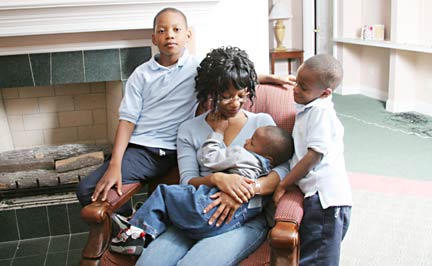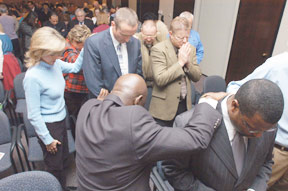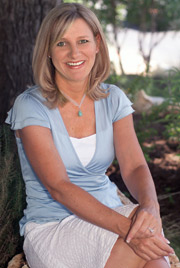2006 Archives
-
-
-
Oprah’s message makes spiritual impact
Posted: 2/3/06
Oprah’s message makes spiritual impact
By Rachel Pomerance
Religion News Service
WASHINGTON (RNS)—For millions of people struggling with their daily woes, there is a lifeline. Her name is Oprah Winfrey.
Despite a recent on-air admission that she “made a mistake” in promoting a discredited book about addiction recovery, Oprah is a spiritual force.
Young praise dancers surprise Oprah Winfrey with a dance in her honor during the talk show host's visit to Olivet Institutional Baptist Church in Cleveland. (Photo by Rodney Brown/RNS) 02/03/2006 - By John Rutledge
-
Buckner Family Pathways provides circle of support
Posted: 2/3/06
Buckner Family Pathways provides circle of support
By Felicia Fuller
Buckner Benevolences
DALLAS—For more than a decade, Cawindy Spead’s downcast eyes revealed things she can talk about only now.
Family Place mothers say their children are blessed by the Buckner experience. (Photo by Amy Seale) “I was the classic abused wife,” said Spead, a 36-year-old mother of two. “My first marriage was to my son’s father. Day One was terrible. He hit me. I was more like a maid service than a wife. I ended up staying in the marriage about five years.
02/03/2006 - By John Rutledge
-
Purity pledgers more likely to wait until their honeymoon
Posted: 2/3/06
Purity pledgers more likely to wait until their honeymoon
By Ken Camp
Managing Editor
WACO—Many church-going Texas Baptist young couples acknowledge having sex before marriage, but they are much more likely to wait until their honeymoon if they take a formal purity pledge like True Love Waits, research reveals.
Click for larger .pdf image Byron Weathersbee, interim university chaplain at Baylor University, analyzed sexual purity pledges and sex education in a Christian context as the focus of his doctoral dissertation.
02/03/2006 - By John Rutledge
-
RIGHT OR WRONG?: Friends with a pot of gold
Posted: 2/3/06
RIGHT OR WRONG?: Friends with a pot of gold
A friend approached me the other day with what he called “a tremendous money-making opportunity.” To participate, I needed to give him $1,000 up front, and my part would be to find people who would put up $1,000 to me. He’s my friend, so how should I respond?
This question raises two important ethical issues. The first concerns the nature of this “money-making opportunity.” It sounds like a Ponzi scheme. These illegal pyramid schemes are named for Charles Ponzi, who duped thousands of New England residents in a postage stamp speculation scheme in the 1920s. Ponzi promised his investors he could double their money in 90 days. The average investor gave Ponzi $300. At the height of his scheme, he had estimated income of $1 million per week. Ponzi went bankrupt and was sent to prison. Later, he re-emerged in Florida and began a pyramid land scheme. He went to prison again and died in poverty in Brazil in 1949.
One might be tempted to think such scams were only successful in the past. Unfortunately, they continue to work in the 21st century. Based on a “rob-Peter-to-pay-Paul” principle, the schemers, like Ponzi, use the investments of new investors to pay off early investors. But eventually, the whole enterprise collapses.
02/03/2006 - By John Rutledge
-
Belton church broadens scope of sanctity of life focus
Posted: 2/3/06
Belton church broadens scope of sanctity of life focus
By George Henson
Staff Writer
BELTON—Annual sanctity of life emphases are common in many Baptist churches, but Suzanne Besser led First Baptist Church in Belton to broaden its scope beyond discussions of abortion and euthanasia.
The finger printing of children for identification purposes was combined with crafts to make for a non-threatening experience at the Sanctity of Life Fair held at First Baptist Church in Belton. (Photo by George Henson) Besser acknowledges her passion for the sanctity of human life has its roots in a friend’s decision to have an abortion more than 20 years ago, but she feels it’s important to not make abortion the central focus for her church’s Sanctity of Human Life Fair.
02/03/2006 - By John Rutledge
-
SECOND OPINION: Why ‘inerrancy’ doesn’t matter
Posted: 2/3/06
Why ‘inerrancy’ doesn’t matter
Truett Seminary student recruiters tell me the most frequent question they receive when promoting the seminary at Baptist colleges and universities is about biblical inerrancy. Does the seminary teach that the Bible is inerrant? Do the professors believe in inerrancy? The answers are easy. As a good Baptist seminary, Truett does not dictate what people must believe on secondary matters of doctrine; the professors vary in their views of biblical accuracy while holding firmly to biblical authority.
“But wait a minute,” someone will say. “How can you believe in biblical authority and not believe in inerrancy?” That’s an important and valid question that needs to be addressed. I hope you will bear with me as I rush in where angels fear to tread.
For at least the past century, the word “inerrancy” has been a buzzword of controversy among evangelical Christians and Baptists in the United States. Nowhere else has it been such a catalyst for debate and division. For centuries, equally sincere God-fearing, Jesus-loving, Bible-believing Christians were satisfied to say that the Bible is inspired, authoritative, trustworthy and (often) infallible. “Inerrancy” was raised as a standard against liberalism and higher criticism of the Bible by the rationalistic Princeton theologians of the 19th and early 20th century. Their names are familiar to all students of American theology: Archibald Alexander, Charles Hodge, A.A. Hodge, Benjamin B. Warfield and J. Gresham Machen. As a group, they formed a dynasty of conservative evangelical theology that helped launch the fundamentalist movement in the early 20th century.
Perhaps the greatest influence of all was exercised by Warfield, who published scores of scholarly and popular books and articles on subjects related to the Bible. He believed strongly in and defended biblical inerrancy. But he did not think belief in it necessary for authentic evangelical faith. Another great evangelical thinker of that time was Scottish theologian James Orr, who did not believe in inerrancy. Warfield and Orr were friends and worked together to fight off liberal theology. Orr contributed to the series of booklets called The Fundamentals that gave the movement its name.
02/03/2006 - By John Rutledge
-
BGCT names 10 regional congregational strategists
Posted: 2/3/06
BGCT names 10 regional congregational strategists
By John Hall
Texas Baptist Communications
DALLAS—The Baptist General Convention of Texas has named 10 congregational strategists—convention staff members who will live in designated areas around the state and work with churches in their assigned regions. They will begin serving on the field by March 1.
BGCT President Michael Bell (center) prays for Congregational Strategists Tim Randolph and Michael Evans during a BGCT staff worship service. (Photo by John Hall) Most of congregational strategists will work from their homes, and each is expected to follow a plan for strategically ministering to every church in a particular area, said Andre Punch, who directs the group.
02/03/2006 - By John Rutledge
-
Texas Tidbits
Posted: 2/3/06
Texas Tidbits
Baylor sets date for inauguration. John Lilley will be installed as Baylor University’s 13th president at a 2 p.m. ceremony on April 21 in the Ferrell Special Events Center. Baylor University Board of Regents Chairman Will Davis of Austin has appointed David Sibley to chair an eight-member presidential inauguration committee to oversee plans for the event. Others serving on the committee are Wes Bailey, James Bowden, Tommy Bowman, Harold Cunningham, Sue Getterman, Ramiro Peña and Donell Teaff, all from Waco.
Church library convention slated in Houston. “Launch Pad for Libraries” is the theme of the statewide 2006 Texas Baptist Church Library Convention, March 9-11 at Tallowood Baptist Church in Houston. Author Robert Flynn of the Texas Institute of Letters and his wife, Jean, a retired teacher and librarian, are keynote speakers. Conference session topics include “libraries in the 21st century,” “weeding and inventory,” “book repair,” “family night at the library” and “archival restoration, preservation and conservation methods.” Individual registration cost before Feb. 10 is $55; late registration is $60. For more information, contact Naomi Taplin or Autumn Hendon at (972) 331-2235.
02/03/2006 - By John Rutledge
-
TOGETHER: Peace, transformation a heart’s desire
Posted: 2/3/06
TOGETHER:
Peace, transformation a heart’s desire
In my previous column, I shared with you the first two of my soul’s desires—beginning new churches and affirming children. Here are two more heart-cries of my soul. Texas Baptists, I appeal to you that we:

Executive Director
BGCT Executive Board
• Pray for God’s peace. No one can be at peace until he finds the presence of God in his soul. Every heart has a God-shaped vacuum. When people try to fill that emptiness with anything less than God, the idol they embrace leaves them disillusioned and yearning for what they do not have. Only God can fill that place God designed for himself.
Pray, too, for peace in communities and nations. Communities that have experienced disasters of flood, fire and wind over the past few months move through their pain with courage and resolve, grateful for the care of those who come to their aid. But after a while, jealousy, suspicion, cynicism, grief and loss all can begin to trouble the collective heart of the community. They need our prayers and our faithful support over a long period.
02/03/2006 - By John Rutledge
-















